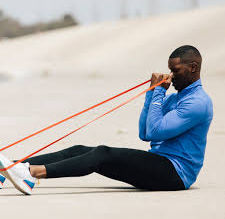Breathing and Performance
- Marvin Johnson
- May 20, 2024
- 3 min read

When one thinks about the pillars of performance, the first thoughts that come to mind are training, nutrition, mindset, and recovery. These pillars of performance are essential, but the one overlooked pillar is breathing. Its's not just a basic necessity for life, but a powerful tool that can significantly enhance an athlete's performance
Breathing should be included in every performance pillar, as athletes need to breathe to live and perform their sport well. Often overlooked by coaches, recent research has found that 15-25% of athletes suffer from asthma-like symptoms, such as wheezing, coughing, congestion, and inability to reach their peak performance.
Breathing is the nutrient of life, and coaches and athletes need to explore how beneficial breathing can be for the body. Incorporating a breathing routine in your workouts will give athletes more muscle endurance and allow them to control their heart rates and muscle recovery over time.
A breathing routine can also help athletes who suffer from anxiety or who are nervous and anxious before and during games. Breathing can help them relax and allow them to reset and focus during stressful situations.
Here are a few breathing techniques that can help you Pre Game In-Game, and Postgame:
Pre - Game
Anxiety and pre-game nerves are standard for all athletes. It can pump you up before games, get you focused, and give you the edge. However, anxiety can backfire and affect your performance by allowing your emotions to get the best of you. It can affect your concentration, increase blood pressure, and create muscle tension.

Box breathing is a great way to help with anxiety and pre-game nerves. It has four equal parts: Inhale, Hold, Exhale, and Hold. Start with 2 seconds, and as you become comfortable with the technique, you can increase the time.
Breathing in for 2 seconds
Hold the Inhale for 2 seconds
Exhale for 2 seconds
Hold the Exhale for 2 seconds
In Game
Many athletes ignore their breathing during training or a game.
This can create many difficulties, but breathing efficiently and effectively during games will increase the amount of Oxygen in your muscles and the amount of oxygenated blood in your heart, which will allow you to play harder and more effectively.
During games, pressure situations may arise. Maybe the game is close, or you're matched up against an opponent who constantly puts you under pressure and challenges you mentally. How can you refocus and control your emotions?
Return to Box Breathing. Extend your exhale time, helping you calm your nerves and refocus.
Post Game
Practicing Breathing after a game helps the nervous system recover. It was found that athletes who practiced breathing techniques post-games could reduce their stress levels and return their heart rate to a relaxed state.

4-7-8 Breathing Technique is a great way to assist the body with recovery.
Start by sitting up in a straight, comfortable position
Place your tongue on the ridge of your gum behind your front teeth
Slow inhale for a count of 4 and expand the diaphragm
Hold your breath for seven seconds
Keeping your tongue in place, open your mouth and slowly for a count of 8
Repeat 4 Times.
Don't wait till the game day to implement or practice your breathing techniques. Incorporate and practice these breathing techniques during your training. The more you practice your breathing, the more efficient you will become and the better your body will adjust to stressful situations.





















This is especially true for big game day anxiety. Combined with a walk I find it very useful